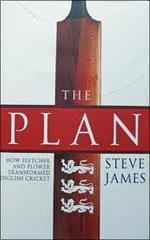The Plan: How Fletcher and Flower Transformed English Cricket
Ewen Day-Collins |Published: 2012
Pages: 357
Author: James, Steve
Publisher: Bantam Press
Rating: 4 stars

“Every fan,” writes Steve James in The Plan, “craves to be inside the dressing room.” It is this sentiment that provides the underlying rhythm to his book. The Plan tells the story – with unrivalled insight – of England’s progression to Test cricket’s summit. James believes two men lie at the heart of this remarkable tale: Duncan Fletcher and Andrew Flower.
They are both Zimbabweans with surnames beginning ‘Fl’, and both England’s head coach over the past decade or so. They individually brought unique concepts, revolutionary ideas and unified teams. James argues the combination of these two regimes provoked England’s rapid success.
James – an “above average county player” awarded a handful of token international caps – is the man to reflect on, hitherto, two glorious careers. Having been coached by Fletcher at Glamorgan and having ghosted his autobiography, as well as playing alongside and against Flower – who remains a friend – he is well informed. Not that the two coaches are companions: “Christmas cards are unlikely to be exchanged.” James, therefore, provides a seamless link.
Yet, what elevates this book from a banal recollection of England’s performances or a dull biography is the close analysis of many other aspects. James plays close attention and provides excellent detail on a number of forgotten topics; garnished thereafter with wonderful insight. The role of the administrators, particularly Lord Maclaurin and Hugh Morris, is explained; the impact of TV sponsorship and income assessed; the National Performance Academy at Loughborough evaluated; the change to a two Division County Championship structure documented; and the introduction of central contracts detailed. “No one single decision,” believes James of central contracts, “has been more important for the improvement of the England cricket team.”
Whether all these fundamental adjustments had such a profound impact as to stimulate the so recent success, as James asserts, is certainly a gripping argument, one I would debate with the author. He argues his view brilliantly.
The Plan – from a very pertinent Zimbabwean phrase “Making a plan” – is supported well through thorough research and extensive interviews. Though Fletcher and Flower are not spoken to directly, the vast range of opinions and perspectives provided give substance to the book.
James is a good writer. Though perhaps not as eloquent as his Sunday Telegraph colleague, Scyld Berry, he does manage to escape the tendency of many player-cum-pundits to write only in inane cliches. Mercifully.
James does, occasionally, give a sense that he fancies being a news reporter. He discusses at considerable length the moral debate as to whether to play cricket in Zimbabwe in 2003 and after, in addition to reviewing the Stanford debacle and the Mumbai attacks. He also lambastes the Schofield Report, though copying verbatim the Report’s many points into his book does induce an urge for sleep.
Unfortunately, James does not often analyse the technical issues of cricket – mainly avoiding aspects such as his former occupation of batting. This is a shame. For, on the few occasions he does include scrutiny on technique, he excels beyond perhaps any cricket journalist from these shores. For this reason, his weekly Sunday Telegraph column is always worth reading.
James does not ignore Peter Moores’ negative influence, but rightly focuses on the architects of England’s success in Fletcher and Flower, though does seem more comfortable looking at the former.
At times, I felt James was tentative to reveal all he knew; too eager perhaps to please sources or friends. For instance, in describing Fletcher’s stubborn character, he references a time when the coach refused to shake a journalist’s hand because of his dislike of the man. James does not tell us who this journalist is. If you?re wondering who (which you probably are), it’s Steven Brenkley of The Independent. Fletcher also dislikes Henry Blofeld of Test Match Special. James must know this (he said it later on a television programme), but frustratingly does not tell all in his book.
In truth, The Plan rather tails off towards the end. The recent nature of the latter stages of Flower’s regime means the analysis and recollections lose impact, and the previously spectacular insight seems diluted. He repeats large chunks of his articles in the later chapters, betraying a lack of fresh thought.
The nature of sport being ever-changing can dramatically contradict previous messages. In the light of the Kevin Pietersen scandal, the observation that Pietersen “fits easily into the Flower and [Andrew] Strauss regime” seems ridiculous. This changeability is no fault of James, yet does undermine some comments in The Plan, hindering slightly the book as a whole.
That should not put off any England fan from purchasing the book. With James’ peerless knowledge of Fletcher and Flower, his captivating analysis and his intriguing access to the mechanisms behind the workings of the England team, The Plan – including a final chapter of direct comparisons between the two coaches that would be cruel to divulge – is an interesting read for any England follower.


Leave a comment